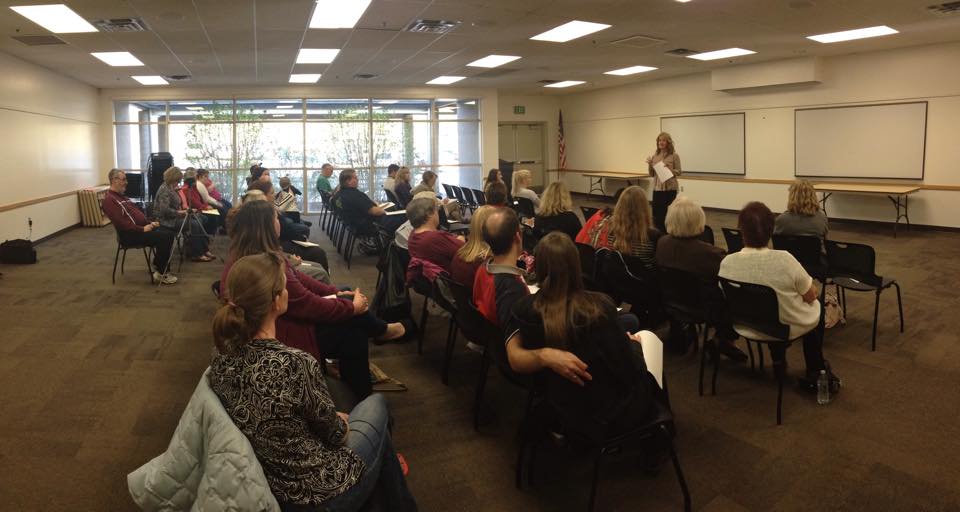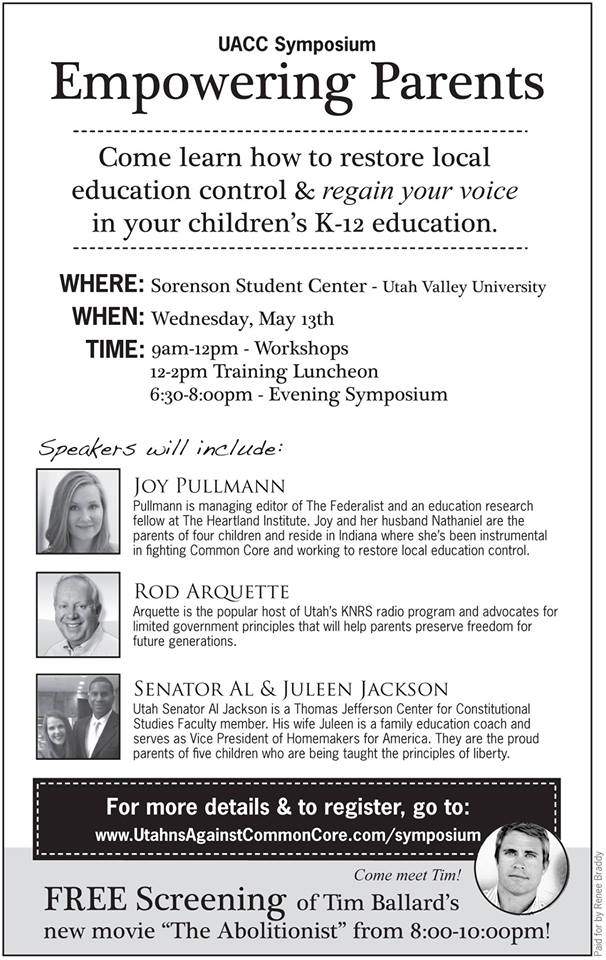I am deviating from today’s book blog post to take about something very important to me. Parental rights in education. The following is a list I’ve gathered from numerous sources of the Utah, Federal and Constitutional laws that protect parents’ and students’ rights. It has become increasingly important for parents, students, teachers and administrators, as well as board members to know these laws and uphold them.
Please read your local school and district policies. Also, when a child is using a portal, app, program or website at school do you know what they are using? Have you read the terms of service and privacy policies?
This is by no means and exhaustive list, it is just what I have found most recently. Let me know in the comments below of other rights written into our laws to add to this list.
Parents’ Rights
FERPA
FERPA provides that an LEA that receives Department funds may not have a policy or practice of denying parents the right to:
-Inspect and review education records within 45 days of a request (34 CFR § 99.10);
-Seek to amend education records believed to be inaccurate (34 CFR §§ 99.20, 99.21, and 99.22); and
– Consent to the disclosure of personally identifiable information from education records except as specified by law (34 CFR §§ 99.30 and 99.31).
Annual Notice
LEAs must annually notify parents and eligible students of their rights under FERPA. 34 CFR§ 99.7. A model FERPA notification for LEAs is enclosed and is also available on FPCO’s Website – http://www2.ed.gov/policy/gen/guid/fpco/ferpa/lea-officials.html.
The annual notification must include:
– The procedure to inspect and review education records;
– The procedure to request amendment of education records;
– A specification of criteria for determining who constitutes a school official and what constitutes a legitimate educational interest if the educational agency or institution discloses or intends to disclose personally identifiable information to school officials without consent; and
– The right of parents to file a complaint with the FPCO in the Department.
In addition, LEAs may want to include with their annual notification of rights under FERPA their directory information public notices, as discussed below.
Sample records request letter
Directory Information
If the LEA or educational institution under the LEA chooses to designate directory information, which can be disclosed from education records without consent, it is required by 34 CFR § 99.37 to notify parents and eligible students concerning its use of directory information. A model “directory information” notice is enclosed and is also available on FPCO’s Web site – www.ed.gov/policy/gen/guid/fpco.
The notice must notify parents and eligible students of:
-The types of information the LEA (or institution) has designated as directory information (see 34 CFR § 99.3 “Directory information” for definition); and,
-The right to opt out of disclosure of directory information.
Protection of Pupil Rights Amendment (PPRA)
Surveys
Statute: 20 U.S.C. § 1232h. Regulations: 34 CFR Part 98.
PPRA applies to the programs and activities of an SEA, LEA, or other recipient of funds under any program funded by the U.S. Department of Education. It governs the administration to students of a survey, analysis, or evaluation that concerns one or more of the following eight protected areas:
1. political affiliations or beliefs of the student or the student’s parent;
2. mental or psychological problems of the student or the student’s family;
3. sex behavior or attitudes;
4. illegal, anti-social, self-incriminating, or demeaning behavior;
5. critical appraisals of other individuals with whom respondents have close family relationships;
6. legally recognized privileged or analogous relationships, such as those of lawyers, physicians, and ministers;
7. religious practices, affiliations, or beliefs of the student or student’s parent; or
8. income (other than that required by law to determine eligibility for participation in a program or for receiving financial assistance under such program).
For surveys that contain questions from one or more of the eight protected areas that are not funded in whole or in part with Department funds, LEAs must notify a parent at least annually, at the beginning of the school year, of the specific or approximate date(s) of the survey and provide the parent with an opportunity to opt his or her child out of participating. LEAs must also notify parents that they have the right to review, upon request, any instructional materials used in connection with any survey that concerns one or more of the eight protected areas and those used as part of the educational curriculum. (A model PPRA general notification for use by LEAs is enclosed and may also be obtained on FPCO’s website at: http://www2.ed.gov/policy/gen/guid/fpco/hottopics/index.html.)
PPRA requires LEAs to work with parents to develop and adopt policies on the following items, unless the LEA or SEA had established comparable policies on or before January 8, 2002:
-The right of parents to inspect, upon request, a survey created by a third party before the survey is administered or distributed by a school to students and the procedure for granting a request by a parent for such access;
-Arrangements to protect student privacy that are provided by the LEA in the event of the administration of a survey to students containing one or more of the eight protected items of information noted above (including the right of parents to inspect, upon request, a survey that concerns one or more of the eight protected items of information);
-The right of parents to inspect, upon request, any instructional material used as part of the educational curriculum for students, and the procedure for granting a request by a parent for such access;
-Administration of physical exams or screenings of students;
-The collection, disclosure, or use of personal information (including items such as a student’s or parent’s first and last name, address, telephone number or social security number) collected from students for marketing purposes, or to sell or otherwise provide the information to others for marketing purposes, including the LEA’s arrangements for protecting student privacy in the event of collection, disclosure, or use of information for these purposes; and
-The right of parents to inspect, upon request, any instrument used in the collection of personal information for marketing or sales purposes before the instrument is administered or distributed to a student and the LEA’s procedure for granting a parent’s request for such access
LEAs must notify parents of their rights under PPRA and of these policies at least annually at the beginning of the school year.
Source http://familypolicy.ed.gov/content/ppra-requirements
Source discussing FERPA, COPPA and PPA – Student Privacy Matters http://www.studentprivacymatters.org/?page_id=317
United States Code
Source: What Are My Parental Rights? Published January 24, 2013, By Morgan Olsen
(c) Surveys or data-gathering activities; regulations
Not later than 240 days after October 20, 1994, the Secretary shall adopt appropriate regulations or procedures, or identify existing regulations or procedures, which protect the rights of privacy of students and their families in connection with any surveys or data-gathering activities conducted, assisted, or authorized by the Secretary or an administrative head of an education agency. Regulations established under this subsection shall include provisions controlling the use, dissemination, and protection of such data. No survey or data-gathering activities shall be conducted by the Secretary, or an administrative head of an education agency under an applicable program, unless such activities are authorized by law.
– Activities involving the collection, disclosure, or use of personal information collected from students for marketing purposes, or to sell or otherwise provide the information to others for marketing purposes; and
– Any non-emergency, invasive physical examination or screening that is 1) required as a condition of attendance; 2) administered by the school and scheduled by the school in advance; and 3) not necessary to protect the immediate health and safety of the student, or of other students. This law does not apply to any physical examination or screening that is permitted or required by State law, including physical examinations or screenings permitted without parental notification.
Right to review Curriculum
(United States Code, Title 20 1232h)
Protection of pupil rights
1232h
(a) Inspection of instructional materials by parents or guardians
All instructional materials, including teacher’s manuals, films, tapes, or other supplementary material which will be used in connection with any survey, analysis, or evaluation as part of any applicable program shall be available for inspection by the parents or guardians of the children.
COPPA
Children’s Online Privacy Protection Act
Section 312.4(d) of the amended Rule identifies the information that must be disclosed in your online privacy policy. While the original Rule required operators to provide extensive categories of information in their online privacy notices, the amended Rule now takes a shorter, more streamlined approach to cover the information collection and use practices most critical to parents. Under the amended Rule, the online notice must state the following three categories of information:
• The name, address, telephone number, and email address of all operators collecting or maintaining personal information through the site or service (or, after listing all such operators, provide the contact information for one that will handle all inquiries from parents);
• A description of what information the operator collects from children, including whether the operator enables children to make their personal information publicly available, how the operator uses such information, and the operator’s disclosure practices for such information; and
• That the parent can review or have deleted the child’s personal information and refuse to permit its further collection or use, and state the procedures for doing so. See 16 C.F.R. § 312.4(d) (“notice on the Web site or online service”).
source: http://business.ftc.gov/documents/0493-Complying-with-COPPA-Frequently-Asked-Questions#Privacy Policies
Student Privacy Matters http://www.studentprivacymatters.org/?page_id=333
sample COPPA opt out form http://meridian.adams12.org/classrooms/201/coppa-opt-out-form
Federal Law- IDEA
There is a robust set of laws protecting parents and students with disabilities find a nice consist list here and full code is here.
Initial evaluation and initial provision of services:
The public agency proposing to conduct an initial evaluation to determine if a child qualifies as a child with a disability under 34 CFR 300.8 must, after providing notice consistent with 34 CFR 300.503 and 300.504, obtain informed consent, consistent with 34 CFR 300.9, from the parent of the child before conducting the evaluation.
[34 CFR 300.300(a)(1)(i)] [20 U.S.C. 1414(a)(1)(D)(i)(I)]
A public agency that is responsible for making FAPE available to a child with a disability must obtain informed consent from the parent of the child before the initial provision of special education and related services to the child.
[34 CFR 300.300(b)(1)] [20 U.S.C. 1414(a)(1)(D)(i)(II)]
Sec. 300.612 Notice to parents.
(a) The SEA must give notice that is adequate to fully inform parents about the requirements of Sec. 300.123, including–
(1) A description of the extent that the notice is given in the native languages of the various population groups in the State;
(2) A description of the children on whom personally identifiable information is maintained, the types of information sought, the methods the State intends to use in gathering the information (including the sources from whom information is gathered), and the uses to be made of the information;
(3) A summary of the policies and procedures that participating agencies must follow regarding storage, disclosure to third parties, retention, and destruction of personally identifiable information; and
(4) A description of all of the rights of parents and children regarding this information, including the rights under FERPA and implementing regulations in 34 CFR part 99.
(b) Before any major identification, location, or evaluation activity, the notice must be published or announced in newspapers or other media, or both, with circulation adequate to notify parents throughout the State of the activity.
(Authority: 20 U.S.C. 1412(a)(8); 1417(c) )
Sec. 300.322 Parent participation.
(a) Public agency responsibility-general. Each public agency must take steps to ensure that one or both of the parents of a child with a disability are present at each IEP Team meeting or are afforded the opportunity to participate, including–
(1) Notifying parents of the meeting early enough to ensure that they will have an opportunity to attend; and
(2) Scheduling the meeting at a mutually agreed on time and place.
(b) Information provided to parents.
(1) The notice required under paragraph (a)(1) of this section must–
(i) Indicate the purpose, time, and location of the meeting and who will be in attendance; and
(ii) Inform the parents of the provisions in Sec. 300.321(a)(6) and (c) (relating to the participation of other individuals on the IEP Team who have knowledge or special expertise about the child), and Sec. 300.321
Section 504 of the Rehabilitation Act of 1973
as amended, 29 U.S.C. § 794
http://www2.ed.gov/about/offices/list/ocr/504faq.html
The implementing regulations for Section 504 as set out in 34 CFR Part 104 provide parents and/
or students with the following rights:
1. Your child has the right to an appropriate education designed to meet his or her individual educational needs as adequately as the needs of non-disabled students. 34 CFR 104.33.
2. Your child has the right to free educational services except for those fees that are imposed on non-disabled students or their parents. Insurers and similar third parties who provide
services not operated by or provided by the recipient are not relieved from an otherwise valid obligation to provide or pay for services provided to a disabled student. 34 CFR
104.33.
3. Your child has a right to participate in an educational setting (academic and nonacademic) with non-disabled students to the maximum extent appropriate to his or her needs. 34
CFR 104.34.
4. Your child has a right to facilities, services, and activities that are comparable to those provided for non-disabled students. 34 CFR 104.34.
5. Your child has a right to an evaluation prior to a Section 504 determination of eligibility. 34CFR 104.35.
6. You have the right to not consent to the school system’s request to evaluate your child. 34CFR 104.35.
7. You have the right to ensure that evaluation procedures, which may include testing, conform to the requirements of 34 CFR 104.35.
Source: Georgia Department of Education, Dr. John D. Barge, State School Superintendent, February 13, 2011
Utah Code
53A-13-301. Application of state and federal law to the administration and operation of public schools — Student information confidentiality standards — Local school board and charter school governing board policies.
(1) An employee, student aide, volunteer, or other agent of the state’s public education system shall protect the privacy of students, their parents, and their families, and support parental involvement in the education of their children through compliance with the protections provided for family and student privacy under Section 53A-13-302 and the Federal Family Educational Rights and Privacy Act and related provisions under 20 U.S.C. 1232g and 1232h, in the administration and operation of all public school programs, regardless of the source of funding.
(2) A local school board or charter school governing board shall enact policies governing the protection of family and student privacy as required by this section.
http://le.utah.gov/xcode/Title53A/Chapter13/53A-13-S109.html?v=C53A-13-S109_2014040320140513
Sources and video: Utah Senator Margaret Dayton addresses the 2014 Agency-Based Education conference on the topic of parent rights in education and the current state of those rights in Utah law. Parental Rights in Education and Utah Law 2014 conference
Utah Code 53A-13-109.
D) the primary responsibility for the education of children within the state resides with their parents or guardians and that the role of state and local governments is to support and assist parents in fulfilling that responsibility;
http://le.utah.gov/xcode/Title53A/Chapter13/53A-13-S109.html?v=C53A-13-S109_2014040320140513
Utah Code 30-5a-103
(1)In accordance with Section 62A-4a-201, it is the public policy of this state that parents retain the fundamental right and duty to exercise primary control over the care, supervision, upbringing, and education of their children. There is a rebuttable presumption that a parent’s decisions are in the child’s best interests.
http://le.utah.gov/xcode/Title30/Chapter5A/30-5a-S103.html?v=C30-5a-S103_1800010118000101
Utah Code 62A-4a-201.
Rights of parents — Children’s rights — Interest and responsibility of state.
(1)(a)Under both the United States Constitution and the constitution of this state, a parent possesses a fundamental liberty interest in the care, custody, and management of the parent’s children.
http://le.utah.gov/xcode/Title62A/Chapter4A/62A-4a-S201.html?v=C62A-4a-S201_1800010118000101
SB122
Second Substitute Parental Rights in Public Education
Part 15. Parental Rights
31 53A-15-1501. Definitions.
32 As used in this part:
33 (1) “LEA” means a school district, charter school, or the Utah Schools for the Deaf and
34 the Blind.
35 (2) “Reasonably accommodate” means an LEA shall make its best effort to enable a
36 parent or guardian to exercise a parental right specified in Section 53A-15-1503 :
37 (a) without substantial impact to staff and resources, including employee working
38 conditions, safety and supervision on school premises and for school activities, and the
39 efficient allocation of expenditures; and
40 (b) while balancing:
41 (i) the parental rights of parents or guardians;
42 (ii) the educational needs of other students;
43 (iii) the academic and behavioral impacts to a classroom;
44 (iv) a teacher’s workload; and
45 (v) the assurance of the safe and efficient operation of a school.
46 Section 2. Section 53A-15-1502 is enacted to read:
47 53A-15-1502. Annual notice of parental rights.
48 An LEA shall annually notify a parent or guardian of a student enrolled in the LEA of
49 the parent’s or guardian’s rights as specified in this part.
50 Section 3. Section 53A-15-1503 is enacted to read:
51 53A-15-1503. Parental right to academic accommodations.
52 (1) (a) A student’s parent or guardian is the primary person responsible for the
53 education of the student, and the state is in a secondary and supportive role to the parent or
54 guardian. As such, a student’s parent or guardian has the right to reasonable academic
55 accommodations from the student’s LEA as specified in this section.
56 (b) Each accommodation shall be considered on an individual basis and no student
57 shall be considered to a greater or lesser degree than any other student.
58 (c) The parental rights specified in this section do not include all the rights or
59 accommodations that may be available to a student’s parent or guardian as a user of the public
60 education system.
61 (2) An LEA shall reasonably accommodate a parent’s or guardian’s written request to
62 retain a student on grade level based on the student’s academic ability or the student’s social,
63 emotional, or physical maturity.
64 (3) An LEA shall reasonably accommodate a parent’s or guardian’s initial selection of a
65 teacher or request for a change of teacher.
66 (4) An LEA shall reasonably accommodate the request of a student’s parent or guardian
67 to visit and observe any class the student attends.
68 (5) (a) An LEA shall reasonably accommodate a written request of a student’s parent or
69 guardian to excuse the student from attendance for a family event or visit to a health care
70 provider, without obtaining a note from the provider.
86 (9) (a) Upon the written request of a student’s parent or guardian, an LEA shall excuse
87 the student from taking a test that is administered statewide or the National Assessment of
88 Educational Progress.
89 (b) The State Board of Education shall ensure through board rule that neither an LEA
90 nor its employees are negatively impacted through school grading or employee evaluation due
91 to a student not taking a test pursuant to Subsection (9)(a).
http://le.utah.gov/~2014/bills/static/sb0122.html
Opt out of in school vision screening
R384. Health, Disease Control and Prevention, Health Promotion.
Rule R384-201. School-Based Vision Screening for Students in Public Schools.
As in effect on November 1, 2014
(3) Parents/legal guardian of a child have the right not to participate in vision screening due to personal beliefs. All parents must be notified of scheduled vision screenings by the public school to provide an opportunity to opt out of screening for their child utilizing the vision screening exemption form, available at the public school, to document a personally held belief.
http://www.rules.utah.gov/publicat/code/r384/r384-201.htm
Opt out of Immunizations
R396-100-5. Exemptions.
A parent claiming an exemption to immunization for medical, religious or personal reasons, as allowed by Section 53A-11-302, shall provide to the student’s school or early childhood program the required completed forms. The school or early childhood program shall attach the forms to the student’s USIR.
http://www.rules.utah.gov/publicat/code/r396/r396-100.htm#T5
Fees
R277-407-3. Classes and Activities During the Regular School Day.
A. No fee may be charged in kindergarten through sixth grades for materials, textbooks, supplies, or for any class or regular school day activity, including assemblies and field trips.
R277-407-4. School Activities Outside of the Regular School Day.
A. Fees may be charged, subject to the provisions of Section R277-407-6, in connection with any school-sponsored activity which does not take place during the regular school day, regardless of the age or grade level of the student, if participation is voluntary and does not affect a student’s grade or ability to participate fully in any course taught during the regular school day.
http://www.rules.utah.gov/publicat/code/r277/r277-407.htm
Homeschooling
Utah Code Title 53A Chapter 11 Section 2
53A-11-102
To educate your child at home, you must submit a signed affidavit to your school district. Although the law doesn’t dictate the time of year, this is usually done during the summer months. By submitting the affidavit, you are informing the school district that your child will attend a home school and that you assume sole responsibility for your child’s education.
Source: http://www.uhea.org/legal-issues/homeschooling-affidavits#sthash.QGfVPiY5.dpufDual
Dual Enrollment Homeschooling
R277-438-3. Private and Home School Student Participation in Public School Extracurricular or Co-curricular School Activities.
A. Students exempted from compulsory public school education by the local board for instruction in private or home schools may be eligible for participation in extracurricular or co-curricular public school activities provided they are taking courses comparable to traditional school courses or earning credit under options outlined in R277- 700-6 in at least as many of the designated courses as required by the local board of students for participation in that activity.
B. The private or home school student may only participate in extracurricular or co-curricular school day activities at the school within whose boundaries the student’s custodial parent(s) or legal guardian resides.
C. Dual enrollment students shall be eligible for extracurricular or co-curricular school activities consistent with eligibility standards for fully enrolled traditional public school students, including providing report cards and citizenship information to activity sponsors and coaches upon request.
R277-438-4. Fees for Private and Home School Students.
A. Private and home school students are responsible for student participation fees in the same manner as full-time public school students.
B. Student participation fees for private, charter, online or home school students shall be waived by the school or school district if students are eligible and parents provide required documentation under Section 53A-12- 103 and R277-407, School Fees. The charter or online schools shall be responsible for payment of waived fees to the resident school district.
http://www.rules.utah.gov/publicat/code/r277/r277-438.htm
Homeschooling affadavits at UHEA
Religious Freedom- Student’s Rights
R277-105-6. Student Expression.
A. A student participating in a classroom discussion, presentation, or assignment, or in a school sponsored activity, shall not be prohibited from expressing personal beliefs of any kind nor be penalized for so doing, unless the conduct:
(1) unreasonably interferes with order or discipline;
(2) threatens the well-being of persons or property; or
(3) violates concepts of civility or propriety appropriate in a school setting.
B. Students may initiate and conduct voluntary religious activities or otherwise exercise their religious freedom on school grounds during discretionary time. Individuals not currently enrolled as students in the school may neither conduct nor regularly attend the activities. School officials may neither conduct nor actively participate in the activities, but may be present as necessary to ensure proper observance of school rules and may limit or prohibit student activities under this section which:
(1) unreasonably interfere with the ability of school officials to maintain order and discipline;
(2) threaten the well-being of persons or property; or
(3) violate concepts of civility or propriety appropriate in a school setting.
http://www.rules.utah.gov/publicat/code/r277/r277-105.htm







































